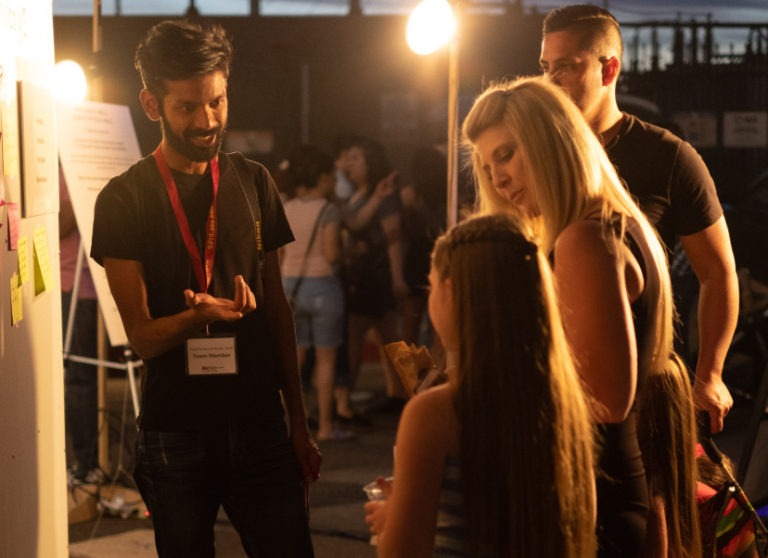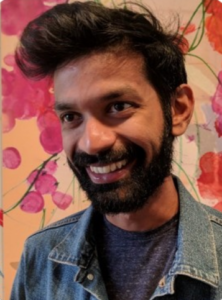
re-Engineered is a laboratory based at Arizona State University which aims to get every engineer asking themselves three questions: Why am I an engineer? For whose benefit do I work? What is the full measure of my moral and social responsibility? These questions are inspired by Science for the People – a movement from the anti-Vietnam War days, in which scientists and engineers questioned the use of their work for warfare. Darshan Karwat, founder of re-Engineered, spoke to ESAL about the laboratory.

Darshan Karwat, re-Engineered Founder
RD: What was the gap you wanted to fill?
Karwat: We are trying to imagine an engineering profession that centers on ideas of environmental protection, social justice, and peace. In other words, we aim to develop a new ethos and culture of engineering by changing attitudes within the field, and the practice of economic models that support it. Our work spans from the philosophical to the practical aspects, and we encourage engineers to think more critically and holistically about what they do — the design, the research, the collaboration.
One question I have been thinking about is, why do engineers continue to work on technological systems we know are destructive to the Earth and increase humans’ abilities to inflict harm on others? Do engineers want to be in these professions, or are those the only opportunities available? Given the challenges of student debt and other obligations, I have heard engineers go through moral gymnastics to justify their work to themselves, when they would rather be doing other things. Engineering and science are political endeavors that can create different kinds of possibilities in the world, and re-Engineered aims to explore and bring them into existence through using engineering and science to address social, environmental, political, and economic challenges.
RD: What kinds of work is re-Engineered currently doing?
Karwat: We have been developing a philosophy of engineering called activist engineering, which plays on the idea of engineers being “problem-solvers,” and can help engineers reflect on the question, “What is the real problem, and does the problem require a technological solution?”
Project Confluence is our effort to mobilize engineers and scientists to collaborate with community groups to address environmental, climate, and energy justice challenges; and provide a different perspective on how engineering and science can be done. We are also attempting to generate more public dialogue on the social responsibility of engineers using the case of the US-Mexico border wall, and we are expanding that work to explore how engineers consider the impact of border barriers on wildlife.
RD: How do you connect with local and state partners?
Karwat: Currently, our focus is on creating an environment in which engineers, scientists, and community groups can collaborate to address long-standing environmental, climate, and energy justice challenges. These community groups have been involved in local- and state-level policymaking, especially around air pollution. We are exploring how to deploy survey and interview tools that we have developed to understand the technological and scientific challenges that community groups are facing in the context of local and state government agencies and organizations.
RD: What is the future vision for the work of re-Engineered?
Karwat: The community-based work of engineers and scientists has, for long, had positive impacts that have remained hyperlocal. re-Engineered wants to build on these successes to create research, development, and engagement approaches that recognize the scale of environmental, climate, and energy injustices across the US. Many communities across the US face similar challenges and given the limited resources currently available to address these injustices, it is crucial we think about how to have the largest impact with those resources.
Furthermore, much of this work is done by engineers and scientists on a voluntary basis, but unless we figure out ways to support this in a financially sustainable manner, the impact of our collective effort will remain at the margins. re-Engineered would love to collaborate with others to address this challenge.
RD: What advice do you have for scientists and engineers who want to get engaged?
Karwat: Our aspirations of the world we want to live in, our values, and others’ values are part of what sets the agenda for engineering and science. I think it is important that engineers and scientists reflect on who and what sets the agenda for the work we do, because it can open up the possibilities for them to deploy their technical skills confidently and rigorously in support of equity, social justice, peace, and environmental protection. Also, make sure you have fun in whatever you do!
Are you involved with an organization or effort that you think might be of interest to the ESAL community? Or have heard about an organization or initiative that you’d like to learn more about? Let us know here, and we may feature it in a future post.